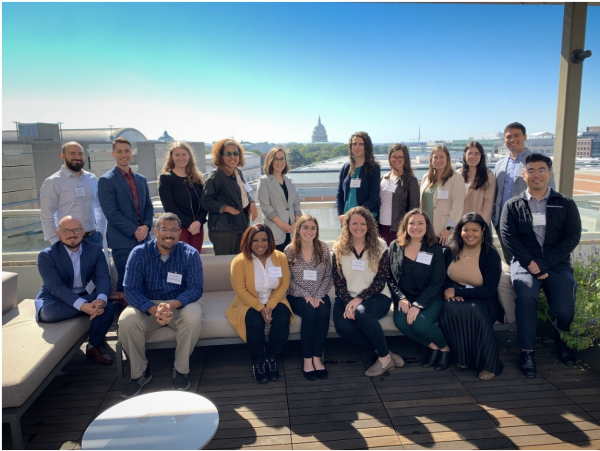On Oct. 13 and 14, 19 Vanderbilt Ph.D. students and postdoctoral scholars traveled to Washington, D.C., to attend the fifth in-person Federal STEM Policy and Advocacy seminar. Vanderbilt University’s and Vanderbilt University Medical Center’s offices of federal relations hosted the two-day conference in partnership with The Vanderbilt Graduate School, the BRET Career Development ASPIRE Program, the Office of Postdoctoral Affairs, the Russell G. Hamilton Graduate Leadership Institute and the Vanderbilt University Career Center. While a condensed virtual version of the event was offered in fall 2020 and 2021, this was the first in-person federal STEM seminar since 2018.
“The program is a unique opportunity for students and postdocs to get a behind-the-scenes glimpse at how science and policy influence each other,” said Kim Petrie, assistant dean for biomedical career development. “It’s rewarding to see this program come full circle and feature former participants who are applying their scientific training [in their] work for government agencies or advocacy organizations.”

One central theme of the seminar was summed up best by Rick Borchelt, director of the Office for Communications and Public Affairs at the Department of Energy, Office of Science, when he told the group: “Communication is policy.” On both days, speakers highlighted the significant role of storytelling in effective advocacy, with emphasis on relationship building as the cornerstone of long-term advocacy. From the importance of understanding one’s audience to prioritizing active listening and creating targeted messaging, the resounding advice participants received was to find a way to share their research so that policymakers may not just understand its importance, but use it to inform policy discussions.
“My scientific and advocacy training at Vanderbilt provided a strong foundation for conveying scientific findings and their implications to diverse audiences,” said Amrita Banerjee, AAAS Science and Technology Policy Fellow at the U.S. Department of State. “In the policy world, these skills are extremely critical to driving informed decision-making. As the need for evidence-based policymaking grows, I would encourage trainees to take advantage of opportunities, such as the VU STEM policy workshop, to develop their communication skills.”
Along with a keynote address by Tara Schwetz, acting principal deputy director of NIH and a former Vanderbilt postdoc, the agenda featured 15 external speakers, five of whom were Vanderbilt alumni. AAU’s Vice President for Science Policy and Global Affairs Toby Smith opened the seminar with an introduction to U.S. science and technology policy, including how these policies can affect the ability of researchers to do science. Sheila Murphy, vice president of advocacy programs and initiatives at Research!America, introduced the federal budget process and federal research and development spending, in particular.
Through three panels, participants learned about science policy issues from officials who work in the executive and legislative branches of government as well as within scientific societies, associations and coalitions that are actively engaged in influencing and promoting federal investments in science and engineering. The panelists sought to give participants an inside view of science policy while providing knowledge of career opportunities in federal science policy.
“Overall I enjoyed my experience, and I recommend this program to any STEM graduate student or postdoc, regardless of their career aspirations. The program provided critical knowledge and insight about how science is done that I would argue every scientist should have, but few scientists actually do,” said Bill Smith, a Ph.D. student in the Department of Physics and Astronomy. “This program exposed me to the thoughts and ideas of scientists and policymakers who focus on [the funding] aspect of the scientific enterprise and what my role in it could be as an early-career astronomer.”
Rounding out the program was an appropriations activity, where participants engaged in a mock congressional conference committee for the spending bill that funds many science-related agencies. This allowed them the opportunity to step into the shoes of policymakers on both sides of the aisle to negotiate and produce a spending agreement that both chambers of Congress and the president could support.
The role-playing element not only highlighted the challenge lawmakers face when appropriating funds and setting related policy for the fiscal year, but, possibly even more distinctly, highlighted the importance of advocates who push members of Congress toward specific funding priorities. “It is easy and convenient to write off politicians and the political process and think, ‘I could do better.’ This exercise challenged me in ways that cutting-edge astrophysics research never has,” Smith said. “There was no correct answer. It was the opposite of how scientists are typically trained to think.”
“We believe that policy is improved when a range of voices are represented in the conversation, and STEM experts bring an important perspective,” said Heather Bloemhard, associate director of federal relations. “The key motivation for the event is shedding light on science policy—as a potential career path or simply as a topic the community should be aware of. We are thrilled that we were able to once again host members of our Vandy community in Washington, D.C., for our STEM seminar.”